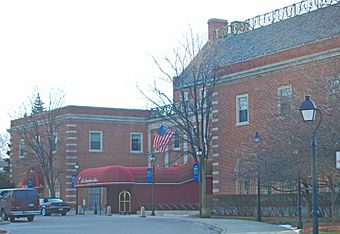The Dearborn Inn facts for kids
|
Dearborn Inn and Colonial Homes
|
|

Dearborn Inn
|
|
| Location | 20301 Oakwood Boulevard Dearborn, Michigan |
|---|---|
| Area | 16 acres (6.5 ha) |
| Built | 1931 |
| Architect | Albert Kahn |
| Architectural style | Georgian |
| NRHP reference No. | 82000549 |
Quick facts for kids Significant dates |
|
| Added to NRHP | December 10, 1982 |
The Dearborn Inn, A Marriott Hotel, is a special historic hotel in Dearborn, Michigan. It was imagined by Henry Ford, the famous car maker. He wanted a nice place for people to stay and eat when they flew into his nearby Ford Airport. This made it one of the very first hotels located near an airport!
The Inn is found at 20301 Oakwood Boulevard, close to The Henry Ford museum and the main office of Ford Motor Company. A famous architect named Albert Kahn designed it in the Georgian style. Today, Ford Motor Land Development Corporation owns the Inn, and Marriott International manages it.
Contents
What Makes the Dearborn Inn Special?
Henry Ford really loved a style of building called Colonial Revival architecture. He asked Albert Kahn to design the Dearborn Inn in this style. Kahn created the beautiful Georgian-style inn in 1931. It was made to serve Ford's airport in Dearborn.
Today, the Dearborn Inn is recognized as a historic place on the National Register of Historic Places. It has 231 rooms for guests. This includes five special "Colonial guest homes" that were built in 1937. The inside of the hotel has been updated over the years, but the outside still looks just like Henry Ford wanted it to.
The Inn also has cool features like:
- Edison's, a fancy restaurant.
- The Ten Eyck Tavern, which serves home-style food.
- A swimming pool that's open in the warmer months.
- A large meeting area, including the Alexandria Ballroom. Henry Ford had this ballroom built because he loved to dance!
A Look Back in Time: The Inn's History
In 1931, Henry Ford saw that people visiting his airport in Dearborn needed a place to stay. So, he asked Albert Kahn, a well-known architect, to design The Dearborn Inn. Henry Ford was very involved in planning the hotel.
The Dearborn Inn was built on a large piece of land across from the Ford Airport. Its Colonial Revival style matched the nearby Edison Institute. The inside of the Inn was decorated in an early American colonial style, which Henry Ford really liked. The Dearborn Inn opened in July 1931, and Henry Ford was the first person to sign the guestbook!
Even though the Ford Airport closed in 1933, the Dearborn Inn kept going strong. It had already become known as one of the best inns in the country.
The Colonial Village Homes
In 1937, five special replica homes were built. These homes created a small "Colonial Village" and added 31 more rooms for guests. Today, you can still stay in these homes, which are copies of the homes of famous Americans. These include Edgar Allan Poe, Walt Whitman, Barbara Fritchie, Oliver Wolcott, and Patrick Henry.
The original plan was to build 18 historic homes in the village. However, World War II stopped the expansion. During the war, pilots from a nearby airport stayed on the first floor of the Inn. Even today, one part of the first floor is called "Pilot's Row."
Amazing Firsts!
The Dearborn Inn has a special place in hotel history because of many "firsts":
- It was called the first airport hotel when it opened.
- In 1937, it became the first hotel in the country to have air conditioning.
- In 1961, it was the first hotel in Michigan to let guests dial phone numbers directly from their rooms.
- The Dearborn Inn is also thought to be one of the first "destination resorts." These are places where families can go for fun activities. The hotel offered things like horseback riding, tennis, dancing, a playground, and even sightseeing trips in a Ford Tri-Motor airplane!
More Rooms and Renovations
In 1960, two more buildings called "motor lodges" were added. These added 54 more rooms to the Inn. They were named the Burbank House and the McGuffey House, after people Henry Ford admired. These new rooms were designed to be larger for families and couples.
Henry Ford loved ballroom dancing. He designed the Alexandria Ballroom to be a place for dancing with family and friends. This ballroom was inspired by a place he had seen in Virginia.
On December 10, 1982, the United States government officially recognized The Dearborn Inn by placing it on the National Register of Historic Places. The state of Michigan also listed it as a historic site in 1983.
The hotel had a big renovation and expansion in 1987. They made the banquet areas bigger and updated all the guest rooms, including the historic homes. The grounds were also beautifully landscaped. The Dearborn Inn was reopened in 1989 as a Marriott Hotel.
In 2008, for its 75th anniversary, the Dearborn Inn was renovated again. Guest rooms and hallways were updated, and new technology was added. In 2009, AAA named The Dearborn Inn one of the top 10 historic hotels in the U.S.
The Dearborn Inn is very close to The Henry Ford museum, which includes the Henry Ford Museum, Greenfield Village, and the Rouge Factory Tour. It's also near other fun places like the Henry Ford Estate, the Detroit Institute of Arts, and the Detroit Zoo.
Images for kids
 | Charles R. Drew |
 | Benjamin Banneker |
 | Jane C. Wright |
 | Roger Arliner Young |




